British Ambassador's interview with German News Agency
Oman’s good relations with Tehran and the West means that it can play an invaluable role in addressing the tensions between the two sides.

British Ambassador Jamie Bowden
1.What are the main aspects of the bilateral relationship?
The closeness of the relationship between Oman and the United Kingdom was highlighted by the magnificent State Visit of Her Majesty The Queen to Muscat in 2010 and the visit of Their Royal Highnesses The Prince of Wales and The Duchess of Cornwall in March 2013 as guests of His Majesty The Sultan
One of the striking features of the relationship between Oman and the UK is its diversity. We enjoy close, fruitful engagement in the trade, investment, defence, security, health, parliamentary, diplomatic, education and cultural fields.
These are all set against the background of an extraordinarily strong and warm relationship. Oman and the UK have been trading for over four hundred years and have been bound by various treaties for over two hundred years. An 1800 treaty between our countries said the friendship of the two states would remain unshook to the end of time; till the sun and the moon have finished their revolving career. So far, we have lived up to the treaty’s hopes.
As important as the formal relationships, though, is the network of close personal relationships between countless Omanis and Britons who have lived, worked and studied in each other’s countries.
2.What is UK/Oman Trade worth and which sectors are most important?
In 2012 British exports to Oman were worth £451m and Omani exports to the UK £120m. On top of this there were some £195m’s worth of invisible exports. There has been an increase in trade in the first three months of 2013 compared to 2012. Our main visible exports were industrial machinery, vehicles, power generation equipment, electrical appliances, chemicals and defence equipment. In December Oman and the UK signed a contract worth some £2.5 billion for Typhoon and Hawk military aircraft. Our invisible exports are diverse. There are close relationships between a number of Omani and British higher education institutions. Numerous British financial service companies have operations in Muscat, including banks, law firms and accountancy companies. British engineering, architectural and construction companies are also much in evidence.
3.What is UK/Oman investment worth, and which sectors are most important?
I don’t have figures for the significant Omani investment in the UK. But the UK is by far the largest foreign investor in Oman, with some 36% of the total, worth around £5 billion. Most of this is in the oil and gas sector but last year HSBC merged with Oman International Bank to create the second largest bank in the Sultanate. This investment has created a large number of jobs for Omanis, including at the most senior levels.
4.How would you describe development of the Omani economy, now and in the future?
The Omani economy has grown strongly in recent years, including during the international financial crisis on 2008/09. Much of the growth has been on the back of an extensive programme of infrastructure development and the Sultanate enjoys first class roads and power and water distribution networks. The economy is still heavily reliant of income from hydrocarbons and the Government is seeking to diversify it, not least to create private sector jobs for Omani citizens. A key element of this diversification is the development of Oman’s transport infrastructure. Three major ports and their associated free zones, at Duqm, Sohar and Salalah, and the new railway that will link Oman to the other GCC countries, will help exploit Oman’s advantageous geographic location and generate exciting opportunities for investors and a wide range of industries
5.What is the Oman-UK Joint Working Group and what are its objectives?
The Oman-UK Joint Working Group (JWG) was established during the state visit of Her Majesty Queen Elizabeth II to Muscat in 2010 to strengthen the historic friendship between the UK and Oman and further develop our strategic relationship. It meets twice a year, alternating between Muscat and London, under the joint chairmanship of the Secretary General of the Omani Foreign Ministry, Sayyid Badr bin Hamad Al Busaidi, and Alastair Burt, the Parliamentary Under Secretary of State at the Foreign and Commonwealth Office. At each meeting the co-chairs discuss the full range of bilateral and regional issues of interest to both countries. The JWG meetings also always include two sub-groups with thematic agendas that are intended to deliver practical benefits for Omanis and Britons. So far these sub-groups have dealt with education, culture, the development of Small and Medium sized Enterprises and entrepreneurship.
6.What is your view of Oman’s foreign policy, particularly on regional issues such as Yemen, Iran and Syria?
Oman has a long established policy of maintaining good relationships with all countries. The UK greatly respects this position. We work closely with the Omanis on Yemen, where both our countries want to see the security that Yemen needs, and the economic growth and prosperity that are the pre-requisites for Yemen’s long term stability. On Iran, Oman’s unique position of having good relations with both Tehran and with Western countries means that it can play an invaluable role in addressing the tensions between the two sides. We keep in close touch with Oman about the tragedy unfolding in Syria and share the aim of achieving a political solution to the current crisis.
7.Since the protests in 2011 there has been increased international attention on Oman, including on human rights issues. How does the UK view developments in the Sultanate over the past two years?
We discuss all issues, including human rights, with the Omani Government in the context of our close relationship. Unlike in some other Arab countries, His Majesty The Sultan responded to the protests of 2011 by listening to the views of his people. He introduced sweeping economic reforms to improve their standard of living and increased the authority of the elected Majlis ash Shura.